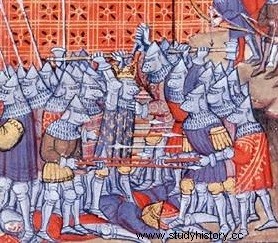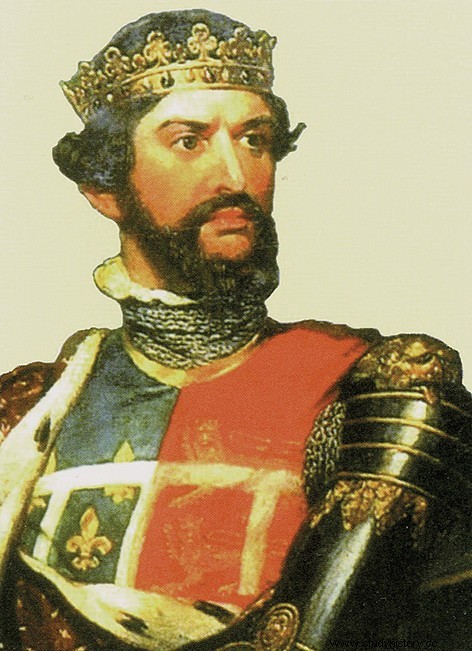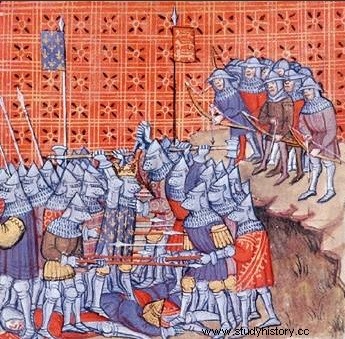 The Battle of Poitiers (September 19, 1356) is a decisive English victory in the Hundred Years' War, won by the Black Prince over the three times larger army of the King of France. The meeting took place in Maupertuis, southeast of Poitiers. Believing to learn from the rout of the French knights at Crécy six years earlier, King Jean II le Bon decides to face his adversaries there, while the English prefigure a new military strategy, by detaching a group of archers. Transformed into infantry, the knights are handicapped by their heavy armor and inadequate armament and are massacred by the English. At the heart of the fight, King Jean, who refuses to flee, is captured, along with his son Philippe. This new military disaster will cause unrest in France and jeopardize the throne of the Valois.
The Battle of Poitiers (September 19, 1356) is a decisive English victory in the Hundred Years' War, won by the Black Prince over the three times larger army of the King of France. The meeting took place in Maupertuis, southeast of Poitiers. Believing to learn from the rout of the French knights at Crécy six years earlier, King Jean II le Bon decides to face his adversaries there, while the English prefigure a new military strategy, by detaching a group of archers. Transformed into infantry, the knights are handicapped by their heavy armor and inadequate armament and are massacred by the English. At the heart of the fight, King Jean, who refuses to flee, is captured, along with his son Philippe. This new military disaster will cause unrest in France and jeopardize the throne of the Valois.
Learning from the defeat at Crécy
After Crécy, the famous English "cavalcades" multiplied, defying a king of France who was largely powerless to react in time and to the extent of the threat. The young Prince of Wales later known as the Black Prince, son of Edward III, was entrusted with Guyenne and earned his reputation by ravaging Languedoc in 1355.
 Aware of the lesson of his father's disaster at Crécy, Jean II, King of France since 1350, tries to reorganize its military means on sound tactical bases, by disciplining and organizing the chivalry or by promoting the use of the crossbow among the people. Faced with the Knightly Order of the Garter created by Edward III, he founded an ephemeral "Order of the Star", a personal vision of the Round Table, whose knights, by virtue of a tactical heresy characteristic of that time, swear never to back down from the enemy.
Aware of the lesson of his father's disaster at Crécy, Jean II, King of France since 1350, tries to reorganize its military means on sound tactical bases, by disciplining and organizing the chivalry or by promoting the use of the crossbow among the people. Faced with the Knightly Order of the Garter created by Edward III, he founded an ephemeral "Order of the Star", a personal vision of the Round Table, whose knights, by virtue of a tactical heresy characteristic of that time, swear never to back down from the enemy.
Battle preparations
In April 1356, when King John was preoccupied with the problems of Normandy, the Black Prince began a new ride from Guyenne northward at the head of a Anglo-Gascon army. The king rounds up his numerous forces (thirty thousand men), sets off in pursuit of the English falling back on Bordeaux, and cuts their way. The meeting takes place eight kilometers south of Poitiers in Maupertuis. On Sunday, September 18, 1356, the two armies were face to face. Numerically superior and in a good position, King John is sure of his victory and accepts a Sunday truce demanded by the representatives of the Pope.
 He organizes his army into four "battles" that he wants more coherent and disciplined than the feudal banners. In the front line, an elite corps of three hundred carefully selected men, "the flower of chivalry", led by the constable of Brienne and the marshals of Clermont and Audrehem, must carry out the initial charge to "open and split the archers”. In the second line, the bulk of the forces, on foot, divided into two battles commanded by the Dauphin Charles and the Duke of Orleans. In reserve, the "battle of the king" including the other French princes. The evening of the 18th is devoted to preparing the equipment for the dismounted combat scheduled for the next day.
He organizes his army into four "battles" that he wants more coherent and disciplined than the feudal banners. In the front line, an elite corps of three hundred carefully selected men, "the flower of chivalry", led by the constable of Brienne and the marshals of Clermont and Audrehem, must carry out the initial charge to "open and split the archers”. In the second line, the bulk of the forces, on foot, divided into two battles commanded by the Dauphin Charles and the Duke of Orleans. In reserve, the "battle of the king" including the other French princes. The evening of the 18th is devoted to preparing the equipment for the dismounted combat scheduled for the next day.
The Battle of Poitiers (1356)
Around the Black Prince, Jean Chandos, a brilliant captain, aware of the impossibility of staying put due to lack of food, develops a plan to escape the French trap:parade in front of the royal army, protected by the hedges on the edge of the woods. It is a provocation:if the French react, the longbows of the Welsh archers placed in the flank-guard of the column will decimate the attacker. If King Jean holds back his troops, the nearby Miosson fords will protect the army and open the road to Bordeaux. Warwick, Suffolk and Captain de Buch command the vanguard. Édouard and Chandos "to guard and advise him" run the center. Salisbury and Oxford bring up the rear.
"You wished yourself, the bascinet in mind, in front of them. But are you there! By this harangue to his knights, King John intends to maintain the spirit of the Order of the Star that he wanted. If the first skirmishes were favorable to the French arms, the Nassau troops even taking a few prisoners, the real start of the battle at dawn on the 19th was disastrous.
 As the English moved according to Chandos' plan, the French vanguard, unable to discipline, suddenly rushes in two different directions while the bulk of the troops are still in camp. “You won’t be so bold today that you put your horse’s muzzle in mine’s ass,” said Clermont, who was killed in the assault, at Audrehem. The latter, who attacks the English vanguard, is not long in being captured. The constable of Brienne attacked with ardor but without result the tail of the English column.
As the English moved according to Chandos' plan, the French vanguard, unable to discipline, suddenly rushes in two different directions while the bulk of the troops are still in camp. “You won’t be so bold today that you put your horse’s muzzle in mine’s ass,” said Clermont, who was killed in the assault, at Audrehem. The latter, who attacks the English vanguard, is not long in being captured. The constable of Brienne attacked with ardor but without result the tail of the English column.
Started but not yet defeated, the army of France rushes towards the English in the greatest disorder. The latter, strengthened by their first success, decide to stand up. The archers decimate the heavily armed French on foot.
The king knows victory is now compromised but himself gives the disastrous signal of defeat by ordering his sons to retire, keeping only the young Philip with him. However, he cannot conceive of flight for himself. Many knights are already following the example of the princes of the Crown and disbanding. Chandos and the Black Prince set off in turn to attack the battle of the king, the ultimate reserve now in the front line. The young Prince Philippe, future Duke of Burgundy, at his side ("Father keep to the right..."), the king surrenders after a furious hand-to-hand combat, defeated, but having preserved his honor as a knight.
The consequences of the French defeat
If the Black Prince gains in Poitiers an unassumed reputation as a great captain, the consequences for France are disastrous. The relative unity of the kingdom is shattered, the people accusing of cowardice a nobility twice decimated in a decade. The young Dauphin, more in love with letters than with war, the future Charles V, finds himself in the uncomfortable position of regent of a kingdom divided as never before and soon amputated by a quarter.
At the Treaty of Brétigny in 1360, the ransom of King John, three million crowns, i.e. two years of tax revenue, and the cession to England of the south-west of the kingdom will be the price of an apparently lasting peace, in reality a mere truce in a still long struggle.
To go further
- Poitiers, September 19, 1356, by Georges Minois. Tallandier, 2014.
- Jean le Bon, by Jean Deviosse. Fayard, 1985.
- The great battles of the Hundred Years War. 50 Minutes, 2015.
